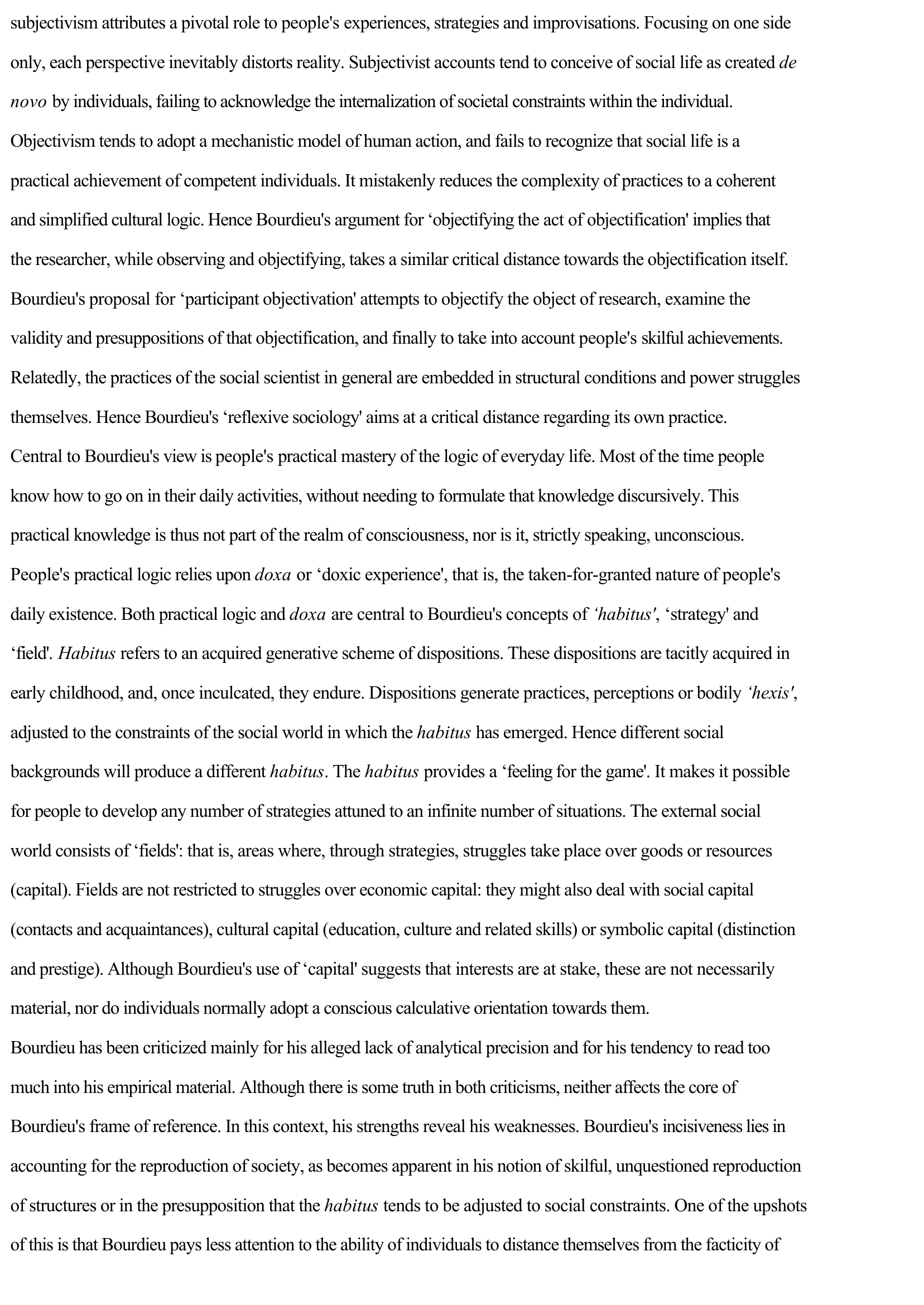Bourdieu, Pierre
Publié le 22/02/2012
Extrait du document


«
subjectivism attributes a pivotal role to people's experiences, strategies and improvisations.
Focusing on one side
only, each perspective inevitably distorts reality.
Subjectivist accounts tend to conceive of social life as created de
novo by individuals, failing to acknowledge the internalization of societal constraints within the individual.
Objectivism tends to adopt a mechanistic model of human action, and fails to recognize that social life is a
practical achievement of competent individuals.
It mistakenly reduces the complexity of practices to a coherent
and simplified cultural logic.
Hence Bourdieu's argument for ‘objectifying the act of objectification' implies that
the researcher, while observing and objectifying, takes a similar critical distance towards the objectification itself.
Bourdieu's proposal for ‘participant objectivation' attempts to objectify the object of research, examine the
validity and presuppositions of that objectification, and finally to take into account people's skilful achievements.
Relatedly, the practices of the social scientist in general are embedded in structural conditions and power struggles
themselves.
Hence Bourdieu's ‘reflexive sociology' aims at a critical distance regarding its own practice.
Central to Bourdieu's view is people's practical mastery of the logic of everyday life.
Most of the time people
know how to go on in their daily activities, without needing to formulate that knowledge discursively.
This
practical knowledge is thus not part of the realm of consciousness, nor is it, strictly speaking, unconscious.
People's practical logic relies upon doxa or ‘doxic experience' , that is, the taken-for-granted nature of people's
daily existence.
Both practical logic and doxa are central to Bourdieu's concepts of ‘habitus' , ‘strategy' and
‘field' .
Habitus refers to an acquired generative scheme of dispositions.
These dispositions are tacitly acquired in
early childhood, and, once inculcated, they endure.
Dispositions generate practices, perceptions or bodily ‘hexis' ,
adjusted to the constraints of the social world in which the habitus has emerged.
Hence different social
backgrounds will produce a different habitus .
The habitus provides a ‘feeling for the game' .
It makes it possible
for people to develop any number of strategies attuned to an infinite number of situations.
The external social
world consists of ‘fields' : that is, areas where, through strategies, struggles take place over goods or resources
(capital).
Fields are not restricted to struggles over economic capital: they might also deal with social capital
(contacts and acquaintances), cultural capital (education, culture and related skills) or symbolic capital (distinction
and prestige).
Although Bourdieu's use of ‘capital' suggests that interests are at stake, these are not necessarily
material, nor do individuals normally adopt a conscious calculative orientation towards them.
Bourdieu has been criticized mainly for his alleged lack of analytical precision and for his tendency to read too
much into his empirical material.
Although there is some truth in both criticisms, neither affects the core of
Bourdieu's frame of reference.
In this context, his strengths reveal his weaknesses.
Bourdieu's incisiveness lies in
accounting for the reproduction of society, as becomes apparent in his notion of skilful, unquestioned reproduction
of structures or in the presupposition that the habitus tends to be adjusted to social constraints.
One of the upshots
of this is that Bourdieu pays less attention to the ability of individuals to distance themselves from the facticity of.
»
↓↓↓ APERÇU DU DOCUMENT ↓↓↓
Liens utiles
- Exposé Pierre Bourdieu la Domination Masculine
- HÉRITIERS: LES ÉTUDIANTS ET LA CULTURE (Les) Pierre Bourdieu et Jean-Claude Passeron
- Pierre Bourdieu, La Leçon sur la leçon (résumé et analyse)
- REPRODUCTION (LA), Éléments d’une théorie du système d’enseignement, Pierre Bourdieu
- DISTINCTION (LA), 1979. Pierre Bourdieu - résumé de l'oeuvre

































